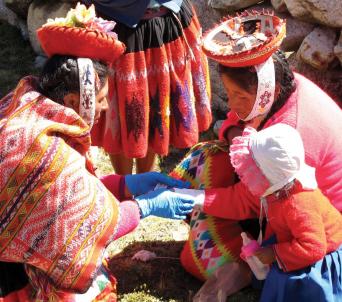
Dining for Women Guest Puts a Face on Successful Health-Care Initiative

A 1-Item Wish List
I asked Keri for a wish list of items our members could donate. Her answer was short — triple antibiotic ointment, any kind, any quantity. Anyone is welcome to contribute. We will present it to Keri when she comes to Mt. Airy. Contact me at bpteutsch@comcast.net for dropoff if you aren’t attending the program.
— Betsy Teutsch
TFW — that feeling when. . . you walk into a cafeteria full of strangers affably chatting and eating together. Ugh. Hello, middle school. This time I reminded myself I was actually at a Club Med, participating in a dream conference called Opportunity Collaboration. Breakfast was a bounteous feast served overlooking the Pacific Ocean. But, still. Who should I sit with?
Collaborating on alleviating global poverty is this annual gathering’s ethos. Delegates introduce themselves to one another by saying “How can I help you?”
This was the backdrop for an extraordinary breakfast. I picked a seat with two random women and conversation quickly flowed. Shazia Khan, the founder of EcoEnergy, a solar business in Pakistan, supplies small businesses. I write about people whose work has exciting impact. Shazia had me at “pay-as-you-go solar”. Alas, what Shazia needs is a $20M investment round, so my “How can I help you?” seemed a little lame.
Then Keri Baker, a nurse-practitioner living in Virginia, described her work with Sacred Valley Health. Located in an impoverished, remote region of Peru, SVH trains indigenous public-health workers who reach out directly to their communities in their native language, Quechua. Their clients rarely interact with the area’s understaffed medical establishment. This is a great model — cost-effective, providing employment, empowering women (95 percent of their promotoras, the Spanish term for lay health workers, are female) and developing local expertise in treating and managing commonly experienced health challenges. Poverty and ill-health go hand-in-hand. Conversely, improving health improves economic security.
“Keri, you should apply for a grant from Dining for Women!” I said. “Your project sounds like just the kind of thing DFW specializes in supporting — grassroots efforts that combine health and education!”
“We ARE the February Dining for Women grantee!” shrieked Keri.
“You have to come to speak in Philly! Our chapters will love meeting you!” I responded.
Keri said yes, and this month, all four of our Weavers Way Dining for Women chapters (Ambler’s launched in January) will gather together so we can meet Keri and hear about SVH’s new nutrition initiative. This is the first time in our six-year history that we’ll host the head of one of the programs we support. It’s a big deal.
Sacred Valley Health dates from when Keri worked on a public health project in Ollantaytambo, a remote Peruvian village. It will be familiar to anyone who has traveled to Machu Picchu, since it is the location of a train station en route to this famous tourist destination. Her team observed the gap between government services and rural indigenous communities; their solution was a mobile clinic. It was so successful they expanded and eventually created the now-thriving Sacred Valley Health model.
Come meet Keri! Dining for Women always welcomes visitors (and potential new members!) to our dinner meetings. For information and the specific location of the Wednesday, Feb. 7, dining, email me at BPTeutsch@comcast.net.
For more info about Sacred Valley Health, visit www. sacredvalleyhealth.org.
Betsy Teutsch is a Weavers Way Working Member.
